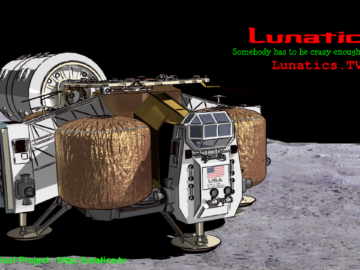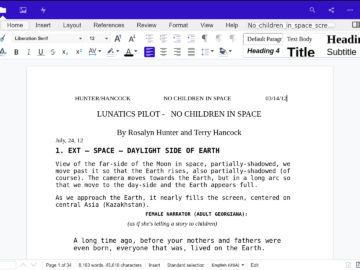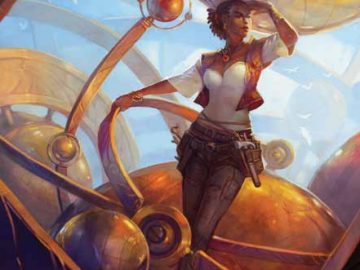Tag: writing
Our show doesn’t really have a single star. Instead we have an ensemble of several colonists, each of whom gets their own stories. But we also want to get them together as for ensemble moments, like this scene of the two main families having their first meal together on the Moon.
During the Apollo era, Walter Cronkite, the famous TV newsman, told a story about interviewing Neil Armstrong. He had asked him what he and Buzz Aldrin would do with their last hours of life on the Moon, should the Lunar Module Ascent Engine fail and strand them there. He was hoping, he said, for some poetic response about doing a last experiment for the benefit of Mankind or contacting their loved ones back on Earth. What Armstrong actually said, though, is something any one of our major characters in Lunatics! would understand implicitly: “Well. I imagine we’d be working on that engine.”
The path we took towards the concept for the pilot episode was pretty convoluted. It arose out of a number of constraints we were trying to deal with when we were planning to launch the “Lunatics!” series. Both “No Children in Space” and “Earth” are drawn roughly from Rosalyn’s original short story, “The Arrival”.
Rosalyn Hunter recently wrote an initial draft of the novella version of “No Children in Space” as part of NaNoWriMo. We’re planning to offer print and e-book copies as part o our upcoming crowd-funding campaign. Here’s a couple of brief excerpts from the story.
If you’re in town, you might want to come see us at Armadillo Con 34 in Austin, Texas (it’s at the Renaissance Hotel Austin ). Terry Hancock and Rosalyn Hunter will be there (we’ve got a small table reserved in the dealer room). Our character artist, Daniel Fu, is also going to be at the convention (although I haven’t tried to rope him into manning our table), so it’s just possible you might see him as well.
Two of the guiding principles in the writing for Lunatics are both rationalisn and optimism . We feel these are trends that a lot of modern science fiction media has strayed away from, and we feel it’s time to bring this more positive vision back to the field. “Darker and grittier” may have its place, but after awhile, it starts to seem a little excessive, and really it’s not as realistic as advertised. In the real world, bad things do happen, but there is also usually a very positive human response to those things, and we’d like to focus on that.
Continuing with themes in the stories for Lunatics… Here’s number twelve: Theme #12 Irrational Reasons versus Rational Excuses for Space Pioneering I know a number of space advocates who claim they want to develop space in order to get “filthy rich”. This is (or was, at least) a very popular claim, especially among openly Libertarian or Republican space enthusiasts as part of a “business-oriented” agenda. There’s just one problem: I don’t care what business plan you come up with, I guarantee you there is an easier way to make that money here on Earth than to do it by developing space.
Continuing with themes in the stories for Lunatics… Here’s number eleven: Theme #11 Real Science and Technology
Continuing with themes in the stories for Lunatics… Here’s number ten: Theme #10 Independence versus Interdependence on the Moon
Continuing with themes in the stories for Lunatics… Here’s number nine: Theme #9 Libertarian Visions of Space versus the Statist Reality of the Space Program Most of the serious space fans I know are in one form or another “libertarians”. They may not be actual members of the Libertarian Party, but they certainly do put a high value on individuality and personal freedom. This is not surprising — after all, they want to go live on another planet. It makes some sense that this might arise from some chafing against Earthly authority.
Continuing with themes in the stories for Lunatics… Here’s number eight: Theme #8 Family Life versus Command Hierarchies Here’s the corporate-minded, government-agency vision for starting a space colony: use your rigorous training and selection program to find eight “perfect humans”, four male, four female. Then convince them to mate and produce offspring. Maybe this would work for hamsters. But for humans, it’s going to be the other way around. ISF crews are recruited as teams and thus based on family ties more than some committee’s ideal team selection parameters. Naturally, there will be some friction between this and the military or civilian agency teams on the Moon.
Continuing with themes in the stories for Lunatics… Here’s number seven: Theme #7 Agrarian Reality versus Technocratic Image I call this the “white plastic walls” fallacy. People have an idea of spaceflight that is derived from the images created in the 1960s Moon program and lots of science fiction shows that try to glamorize it as the ultimate “futuristic” and “urban” experience. Because back then, urban was cool, and rural was always bad.







